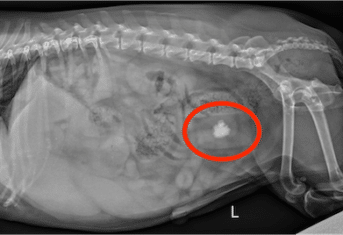Collars vs. Harnesses

Collars vs. Harnesses
A Facebook friend of The Animal Medical Center wrote in and said, “I wish the AMC would run a piece on using halters [harnesses] rather than neck collars on dogs. I cringe every time I see someone dragging their pooch down the street by the neck.”
This request got me thinking which is better, a collar or a harness?
Dog vs. Cat
Choosing a harness or collar may depend on the type of pet you have. Dogs wear a collar or a harness to facilitate leash walking and to hold an identification tag. Most cats (I know it is probably way more than most!) do not walk on a leash and use a collar or harness solely for identification purposes.
If your cat is an indoor-outdoor cat, there is a risk of the collar or harness getting caught or hung up on a branch, board or fence. For these cats, breakaway collars are considered safest. I like the glow in the dark ones if your cat must be out after the sun sets.
When I used to fly or travel in the car with my cat Symba, he would wear a harness. I thought he would be less likely to slip out of the harness than a collar when getting out of his carrier to go through security or to make a pit stop along the road.
Training
A collar is clearly the most popular method of restraint for dogs, possibly because it is commonly used to train a dog. When training large dogs, a harness does not give enough control over the dog, but may work well for training smaller dogs. The collar is used as a negative reinforcement tool for training. Food rewards and clicker training may work better than negative reinforcement for training since both of these methods are considered positive reinforcement. Somewhere between a collar and a harness is a head collar. Two popular types are the Halti and the Gentle Leader. They fit a bit differently and the Gentle Leader works better for short-nosed dogs and the Halti for longer-nosed dogs. The idea behind the head collar is to help the owner to direct the dog rather than to drag the dog around by the collar,which is what concerned our Facebook friend.
Medical Conditions
Certain diseases benefit from switching from a collar to a harness. Dogs with collapsing trachea have a windpipe which flattens out during inspiration and causes a characteristic goose honk cough. Tugging and pulling on a collar puts extra stress on windpipe and will provoke a severe coughing episode. The AMC’s Interventional Radiology/Interventional Endoscopy Service uses stents to treat severe collapsing tracheas. Following stent placement, dogs should never wear a harness as it might fracture the stent.
The Neurology Service of The AMC has a long list of dogs who should not wear a collar as the pressure of the collar on the dog’s neck can worsen spinal cord injuries.
- Chiari malformation of toy dogs
- Wobbler syndrome common in Doberman pinschers, but seen in other breeds as well
- Chondrodystrophic dogs (dogs with abnormal intervertebral discs and short, crooked legs), such as Dachshunds and French bulldogs predisposed to slipped discs in their spinal column
- Hydrocephalic dogs, or dogs with water on the brain
In the end, I am not sure it is possible to make a recommendation for harnesses over collars because each pet is an individual. What is important is for your pet to have an identification tag attached to the collar or harness (and a microchip too!).
________________________________________________________
This may also be found in the “Tales from the Pet Clinic” blog on WebMD.com.
For over a century, The Animal Medical Center has been a national leader in animal health care, known for its expertise, innovation and success in providing routine, specialty and emergency medical care for companion animals. Thanks in part to the enduring generosity of donors, The AMC is also known for its outstanding teaching, research and compassionate community funds. Please help us to continue these efforts. Send your contribution to: The Animal Medical Center, 510 East 62nd Street, New York, NY 10065. For more information, visit www.amcny.org. To make an appointment, please call 212.838.7053.


































